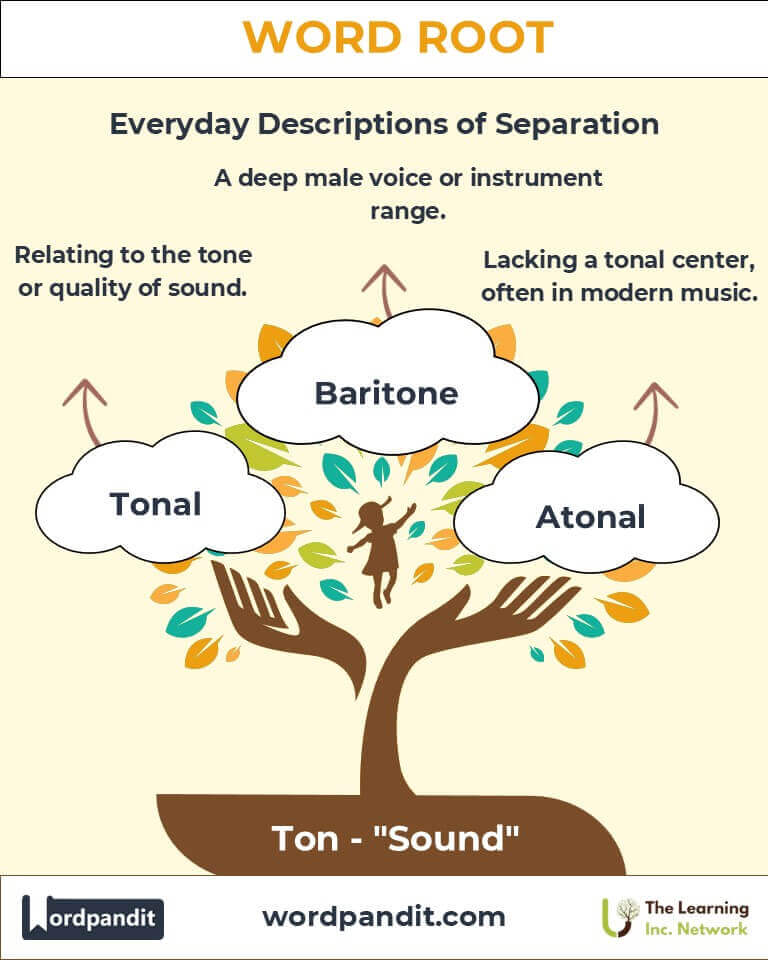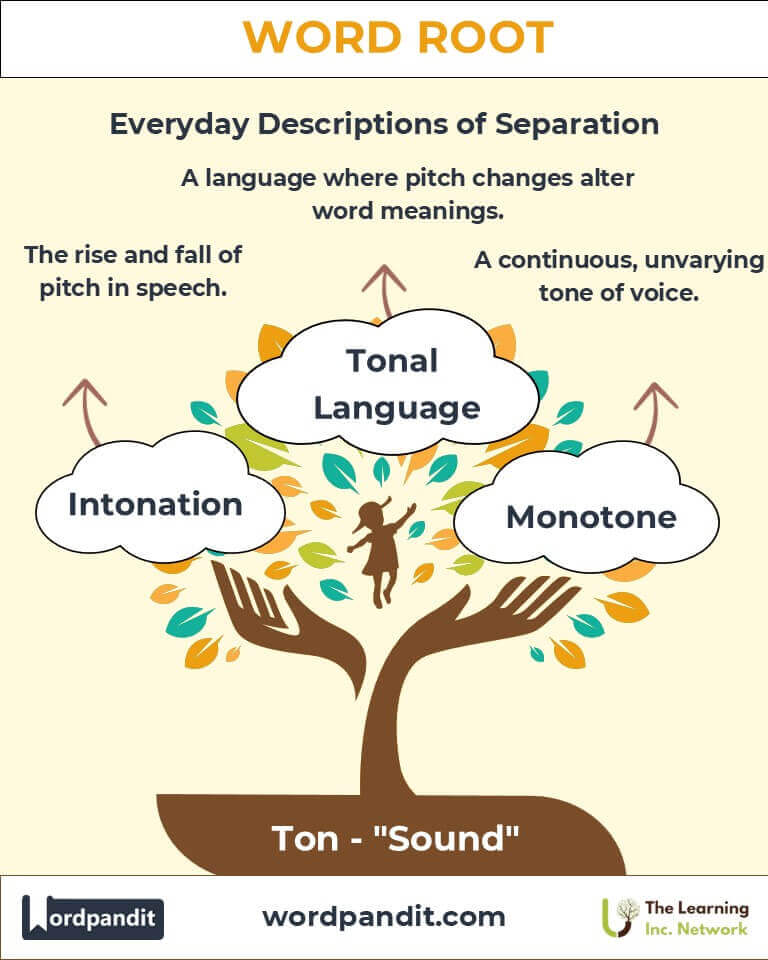Ton: The Sound of Language and Expression
Byline: Delve into the resonance of the word root "Ton," derived from the Greek word tonos, meaning "sound" or "tone." Found in words like "tonal" and "baritone," this root vibrates through the realms of music, speech, and emotion, shaping how we perceive and produce sound.

Table of Contents
- Introduction: The Harmony of "Ton"
- Etymology and Historical Journey
- Mnemonic: Unlocking the Power of "Ton"
- Common "Ton"-Related Terms
- "Ton" Through Time
- "Ton" in Specialized Fields
- Illustrative Story: "Ton" in Action
- Cultural Significance of the "Ton" Root
- The "Ton" Family Tree
- FAQs About the "Ton" Word Root
- Test Your Knowledge: "Ton" Word Root Quiz
- Conclusion: The Living Legacy of "Ton"
1. Introduction: The Harmony of "Ton"
Have you ever considered the power of sound in shaping emotions, communication, and art? The word root Ton, pronounced "tawn," captures this essence. From the tonal shifts in a melody to the rich resonance of a baritone, this root emphasizes the centrality of sound in human expression. Originating from Greek, Ton weaves through music, speech, and even physics, making it a cornerstone in understanding the dynamics of sound and tone.

2. Etymology and Historical Journey
The root Ton comes from the Greek word tonos, meaning "tension" or "tone." In ancient Greece, it referred to the tightening of strings on musical instruments to produce specific sounds. Over time, tonos evolved to describe variations in sound quality and pitch, influencing the vocabulary of music, linguistics, and beyond. As it traveled through Latin and into English, Ton retained its emphasis on sound and vibration, becoming foundational in diverse disciplines.
3. Mnemonic: Unlocking the Power of "Ton"
To remember Ton, think of a tuning fork emitting a pure tone. The vibration symbolizes the root’s essence of sound and resonance.
Mnemonic Device: "Ton tunes the world, from melodies to voices!"
4. Common "Ton"-Related Terms
- Tonal (TOH-nuhl):
- Definition: Relating to the tone or quality of sound.
- Example: "The tonal richness of the piano captivated the audience."
- Baritone (BAIR-ih-tone):
- Definition: A male voice or instrument with a range between tenor and bass.
- Example: "His baritone voice added depth to the choir’s harmony."
- Atonal (AY-toh-nuhl):
- Definition: Lacking a tonal center, often used in modern music.
- Example: "The atonal composition challenged traditional musical conventions."
- Intonation (in-toh-NAY-shun):
- Definition: The rise and fall of pitch in speech.
- Example: "Her intonation conveyed confidence during the presentation."
- Monotone (MAH-no-tone):
- Definition: A continuous, unvarying tone of voice.
- Example: "The lecturer’s monotone made it hard to stay engaged."
5. "Ton" Through Time
- Tonos (Ancient Greek): Initially referring to tension in strings, it became associated with musical tone and pitch.
- Baritone (17th Century): Derived from Greek barys (heavy) and tonos, it described a deep, heavy tone in music.
- Modern Usage: Now a staple in opera and vocal classifications.
6. "Ton" in Specialized Fields
- Music:
- Tonal: Essential for understanding harmony and scale in compositions.
Application: Forms the basis of Western classical music.
- Tonal: Essential for understanding harmony and scale in compositions.
- Linguistics:
- Intonation: Analyzes speech patterns and their impact on meaning.
Relevance: Vital for language learning and phonetics.
- Intonation: Analyzes speech patterns and their impact on meaning.
- Physics:
- Tonal vibration: Studies the physical properties of sound waves.
Application: Crucial in acoustics and sound engineering.
- Tonal vibration: Studies the physical properties of sound waves.
7. Illustrative Story: "Ton" in Action
Mia, a young composer, struggled with creating a harmonious piece for her music class. One evening, she discovered a baritone saxophone in her school’s music room. Inspired by its deep, resonant tones, Mia crafted a symphony that blended the richness of the baritone with the delicate tonal variations of a violin. Her masterpiece earned her top honors, demonstrating the power of Ton to unify diverse sounds into a harmonious whole.
8. Cultural Significance of the "Ton" Root
From Gregorian chants to jazz improvisations, Ton is at the heart of global musical traditions. In linguistics, tonal languages like Mandarin and Yoruba showcase its importance, where shifts in tone alter word meanings. Across cultures, Ton highlights how sound shapes identity, emotion, and communication.

9. The "Ton" Family Tree
- Son (Latin: "sound"):
- Sonar: A system for detecting objects using sound waves.
Example: "Sonar technology is crucial in submarine navigation."
- Sonar: A system for detecting objects using sound waves.
- Phon (Greek: "voice, sound"):
- Phonetics: The study of speech sounds.
Example: "Phonetics helps linguists analyze pronunciation patterns."
- Phonetics: The study of speech sounds.
- Vibr (Latin: "shake, tremble"):
- Vibrato: A musical effect creating a pulsing variation in pitch.
Example: "Her vibrato added emotional depth to the song."
- Vibrato: A musical effect creating a pulsing variation in pitch.

10. FAQs About " Ton "
Q: What does "Ton" mean?
A: "Ton" means "sound" or "tone," derived from the Greek word tonos.
Q: How is "Ton" used in music?
A: It describes qualities like pitch, harmony, and tonal structure.
Q: Is "Ton" related to weight?
A: No, the "ton" referring to weight has a different origin, from Old French tonne (barrel).
Q: What is a tonal language?
A: A language where pitch changes alter word meanings, like Mandarin.
Q: What does "Baritone" mean?
A: It refers to a voice or instrument with a deep tonal range.
11. Test Your Knowledge: " Ton " Mastery Quiz
1. What does the root "Ton" signify?
2. Which word refers to the quality of pitch in speech?
3. What is a Baritone?
4. Which field studies tonal vibrations?
5. What does "Atonal" mean?
12. Conclusion: The Living Legacy of "Ton"
The root Ton resonates through the symphonies of music, the melodies of speech, and the vibrations of the physical world. It reminds us of sound’s power to move, inspire, and connect. As technology and art evolve, Ton will continue to shape how we produce and perceive sound, echoing its timeless significance.














